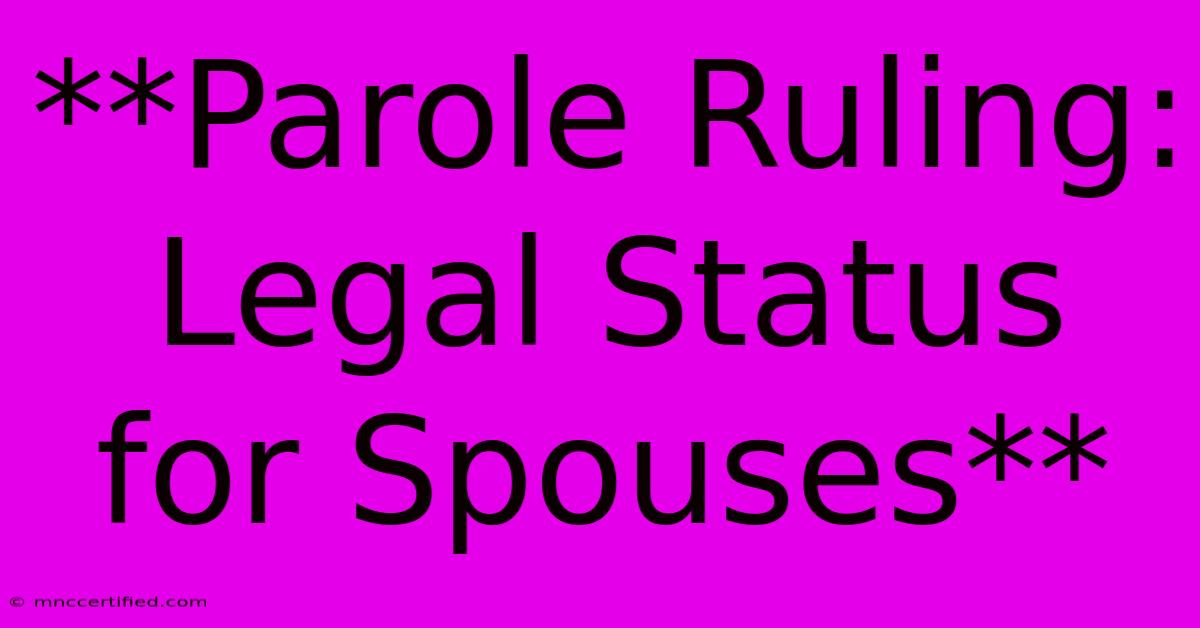**Parole Ruling: Legal Status For Spouses**

Table of Contents
Parole Ruling: Legal Status for Spouses
The possibility of obtaining parole is a lifeline for many individuals facing lengthy prison sentences. But what about their spouses? Can a parole ruling directly impact the legal status of their partner? This question is particularly relevant for spouses who are non-citizens, as their immigration status can be highly sensitive to changes in their partner's legal situation.
Understanding Parole and its Impact on Immigration Status
Parole, in the context of criminal justice, refers to the conditional release of a prisoner before the completion of their sentence. While it offers a chance for reintegration into society, it's crucial to understand that parole does not grant a change in immigration status.
Here's why:
- Parole is not a legal status: It's a temporary arrangement that allows the parolee to live outside prison under specific conditions.
- Immigration status is determined by federal immigration laws: These laws dictate the criteria for various visa categories, citizenship, and other legal statuses.
- Parole decisions are made by state or federal authorities: These decisions are primarily based on factors related to the prisoner's rehabilitation, behavior, and potential risk to society.
Can a Parole Ruling Affect a Spouse's Immigration Status?
While parole itself doesn't directly alter a spouse's immigration status, it can indirectly impact their situation in several ways:
1. Impact on Green Card Applications:
- Green Card through Marriage: If a non-citizen spouse is applying for a Green Card based on their marriage to a U.S. citizen, a parole ruling can affect their application indirectly. A parole ruling could lead to a change in the U.S. citizen spouse's criminal record, which might impact the application's outcome. It's vital to consult an immigration attorney to understand the specific impact of the parole ruling on the Green Card application.
- Green Card through Family Sponsorship: A parole ruling can also influence a Green Card application if the non-citizen spouse is being sponsored by a U.S. citizen family member. If the parolee's criminal record changes due to the parole, it could negatively impact the sponsor's ability to petition for the non-citizen spouse.
2. Potential for Deportation:
- Criminal Record: While parole typically reduces the sentence served, it doesn't erase the criminal record. Depending on the severity of the crime and the individual's immigration history, a criminal record could potentially lead to deportation, even if the parolee has been released.
- Immigration Consequences: If the parolee has committed certain serious crimes, it might automatically trigger deportation proceedings, impacting their non-citizen spouse's legal status.
What Steps Should Spouses Take?
- Seek Legal Advice: It is crucial to consult with an experienced immigration attorney to understand the specific implications of the parole ruling on the non-citizen spouse's legal status.
- Be Prepared for Potential Challenges: Be aware that a parole ruling can potentially create obstacles in obtaining a Green Card or could even trigger deportation proceedings.
- Stay Informed: Keep abreast of any changes in immigration laws or policies that might affect your situation.
- Document Everything: Maintain clear records of all immigration-related documentation, including parole rulings and any correspondence with immigration authorities.
Conclusion
While parole does not directly affect a spouse's legal status, it can have indirect consequences on their immigration journey. Understanding these potential impacts and seeking legal guidance is critical for protecting the rights and future of non-citizen spouses. The best course of action is always to consult with a qualified immigration attorney to navigate the complex legal landscape and ensure the best possible outcome for your situation.

Thank you for visiting our website wich cover about **Parole Ruling: Legal Status For Spouses**. We hope the information provided has been useful to you. Feel free to contact us if you have any questions or need further assistance. See you next time and dont miss to bookmark.
Featured Posts
-
Sodexo Health Insurance Cost Per Month
Nov 09, 2024
-
Cure Insurance Arena View From My Seat
Nov 09, 2024
-
Locked Ins Tennessee Expecting Baby
Nov 09, 2024
-
Greenwich Bay Trading Co Dusting Powder
Nov 09, 2024
-
Londons Lord Mayors Show A Guide
Nov 09, 2024